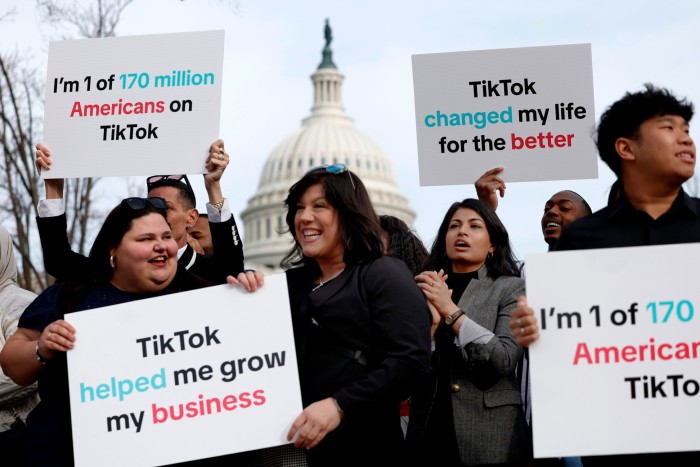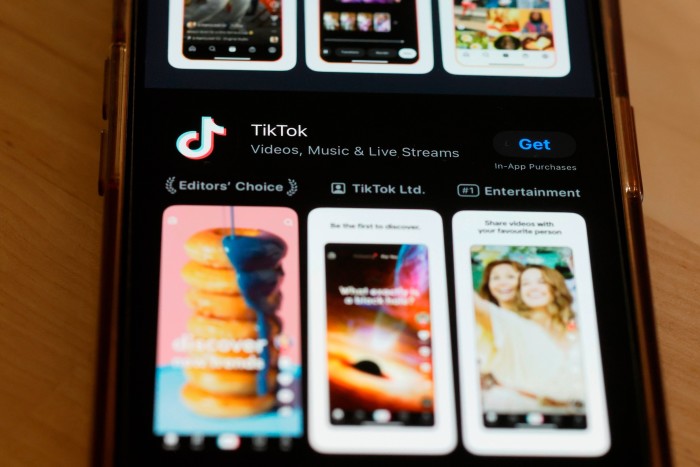
The US House of Representatives’ approval of a bill to ban TikTok from app stores unless it is sold by its Chinese parent company has cemented the video-sharing platform as one of the biggest flashpoints in a wider US-China conflict and has ignited a debate about free speech and data security.
The overwhelming support for the bill has signalled widespread agreement in Washington that TikTok represents a threat to American national security while it is owned by ByteDance. The Chinese company has accused lawmakers of “jamming through” “secret” legislation to outright ban the app, and called on the Senate to reject the bill.
Here is what the vote means for TikTok and its 170mn users in the US.
How would a ban work?
If the bill passes the Senate and is signed into law by President Joe Biden, ByteDance will have six months to sell TikTok to a non-Chinese company or it will be removed from app stores and web access would be blocked in the US.
The law would work by imposing civil penalties on app stores such as Apple’s App Store and Google Play if they distribute or update TikTok. Internet service providers would be compelled to block access to TikTok on the web.
Although app stores and internet providers would be barred from hosting TikTok, individual users would not be subject to any legal enforcement.
A nationwide ban of an app or website is largely uncharted territory for the US — although there has been some precedent at both state and federal levels in recent years.
The state of Montana passed a bill last year to ban TikTok, also by forcing its removal from app stores accessed from inside the state. However, the bill was blocked by a federal judge in November before it was due to go into effect on January 1. Montana is appealing against the decision.
The American government and many individual states have separately banned TikTok on government-owned devices in a bid to keep US data safe from China. Canada and policymaking institutions in the EU have issued similar directives.

What would a ban mean for users?
The TikTok app has already been downloaded to millions of phones in the US — its largest market globally — and it would not disappear from those phones if the ban becomes law. Existing users would not be able to update the app, however, and could not re-download it if they deleted it or wanted to install it on a new phone.
By blocking access to updates, over time the app would become obsolete, but people would not stop using it overnight. TikTok could also still be accessible for users circumventing the law using virtual private networks that encrypt internet traffic and hide IP addresses.
Banning TikTok in the US would have an enormous impact on its booming ecommerce market for big brands and small businesses. It has become the biggest player in the rise of so-called social commerce, where algorithms push products that are highly personalised to the interests of individual consumers, as well as “shoppertainment”, in which ads are blended seamlessly into entertainment content.
TikTok says it is used by more than 7mn small businesses in the US. It has higher engagement rates than other social media platforms, which means it offers brands a greater chance of viral success, as well as access to more than 1bn active monthly users globally. A ban could be a good thing for direct rivals to TikTok’s dominance in social commerce, such as Instagram Shopping and Amazon Inspire, which launched in 2022.
It could also benefit other social media platforms if users turn to alternative apps seeking similar experiences. TikTok has also become a big source of news in the US — a third of adults under the age of 30 say they get their news from the platform, according to Pew Research.
Is TikTok really a national security risk?
The Chinese government has significant control over companies that operate in its jurisdiction, including being able to force them to hand over any national security-related data. This creates the potential for TikTok to be used by China to collect foreign intelligence, although there is no evidence that TikTok’s commercial user data has been used in this way.
As part of a plan to avoid a divestment, over the past three years TikTok has spent more than $1.5bn working on “Project Texas”, a corporate restructuring plan to safeguard US user data and content from Chinese influence through a partnership with American cloud software group Oracle. The standalone unit, which voluntarily walls off American data, is up and running but has failed to persuade US lawmakers that the app is safe.
TikTok collects vast amounts of personal information from its US users that help it push targeted content and ads. Cybersecurity experts have identified TikTok’s ability to track users’ locations, contact lists, personal details and IP addresses, and a clause in its privacy policy that allows it to collect biometric data, including “faceprints and voiceprints” as potential risks to privacy and broader national security. However, several privacy researchers have concluded that TikTok does not collect any more data than other mainstream social networks.
TikTok’s chief executive Shou Zi Chew has said publicly that the Chinese government has never asked TikTok for its data and that it would refuse such a request. But he conceded that China-based employees at ByteDance may have access to some US data from the app.
There are also concerns that Beijing’s ability to access TikTok’s algorithms could allow it to influence what users see on the platform, including pushing disinformation and propaganda to users, which would be a particularly significant issue during an election year in the US.

What can TikTok do to stop a ban?
TikTok conducted an intense lobbying campaign ahead of Wednesday’s vote, which was largely ignored by Congress. It used its own app to urge users to call members of Congress to oppose the bill. TikTok is likely to step up that campaign in a bid to influence the next stage of the legislation in the Senate.
It could also align its lobbying efforts more closely with Donald Trump, the presumptive Republican nominee for president in 2024, who has come out against a ban — despite his earlier opposition to the app while he was president.
Other avenues of recourse for TikTok include a lawsuit against the American government — which would need to be brought within 165 days of the bill becoming law. The company sued the US in 2020 when Trump issued an executive order to block the app from operating in the country and gave ByteDance 90 days to divest from its American assets and any data that TikTok had collected in the US. A judge blocked it hours before it was to take effect, and Biden rescinded Trump’s order when he took office.
The most obvious way for TikTok to avoid a ban is through a sale that separates the app and its US user data from its Chinese parent company. However, this is unlikely. In 2020, China updated its export control rules to effectively give Beijing a say in any deal that would sell Chinese technology to an American buyer. Last year, China’s commerce ministry said it would “firmly oppose” a forced sale of TikTok.
Chew has proposed multiple alternative measures to a sale for allaying US national security concerns, including the “Project Texas” plan, and a potential American stock market listing of TikTok.

